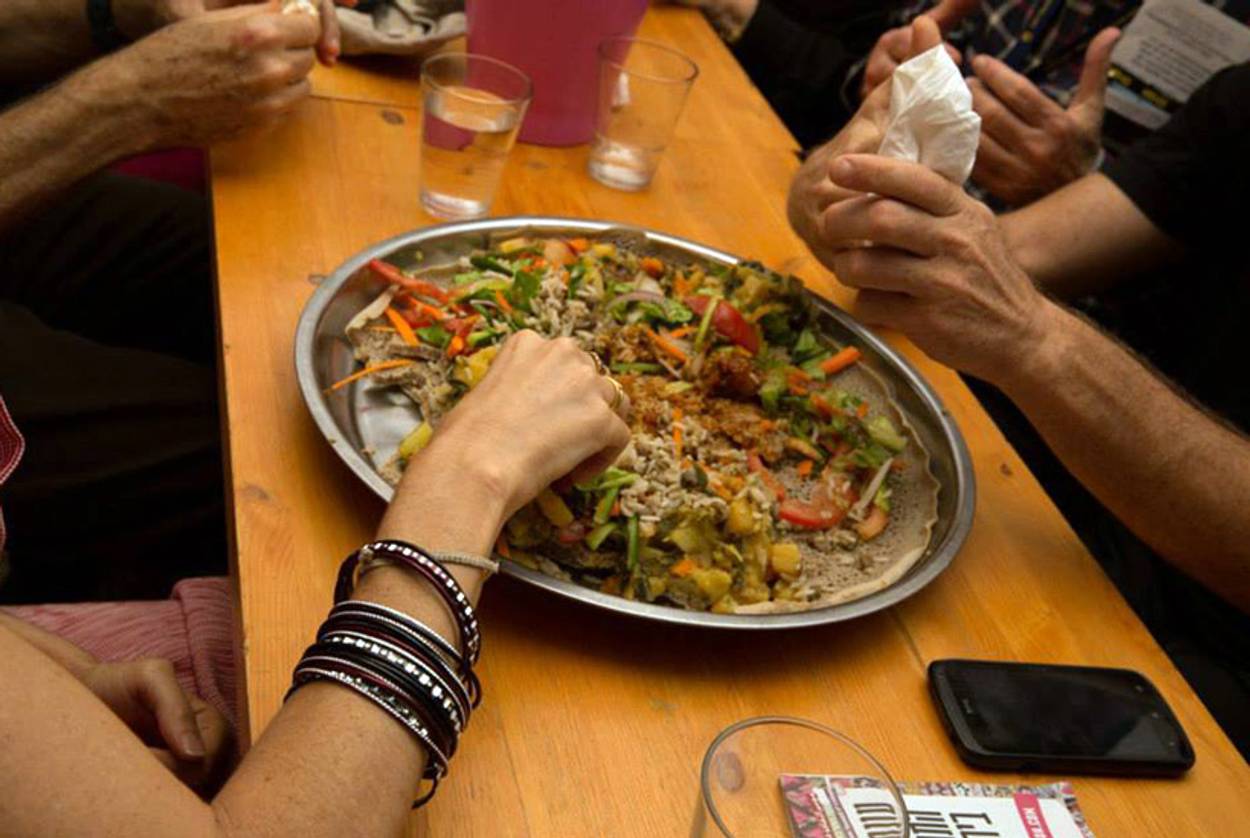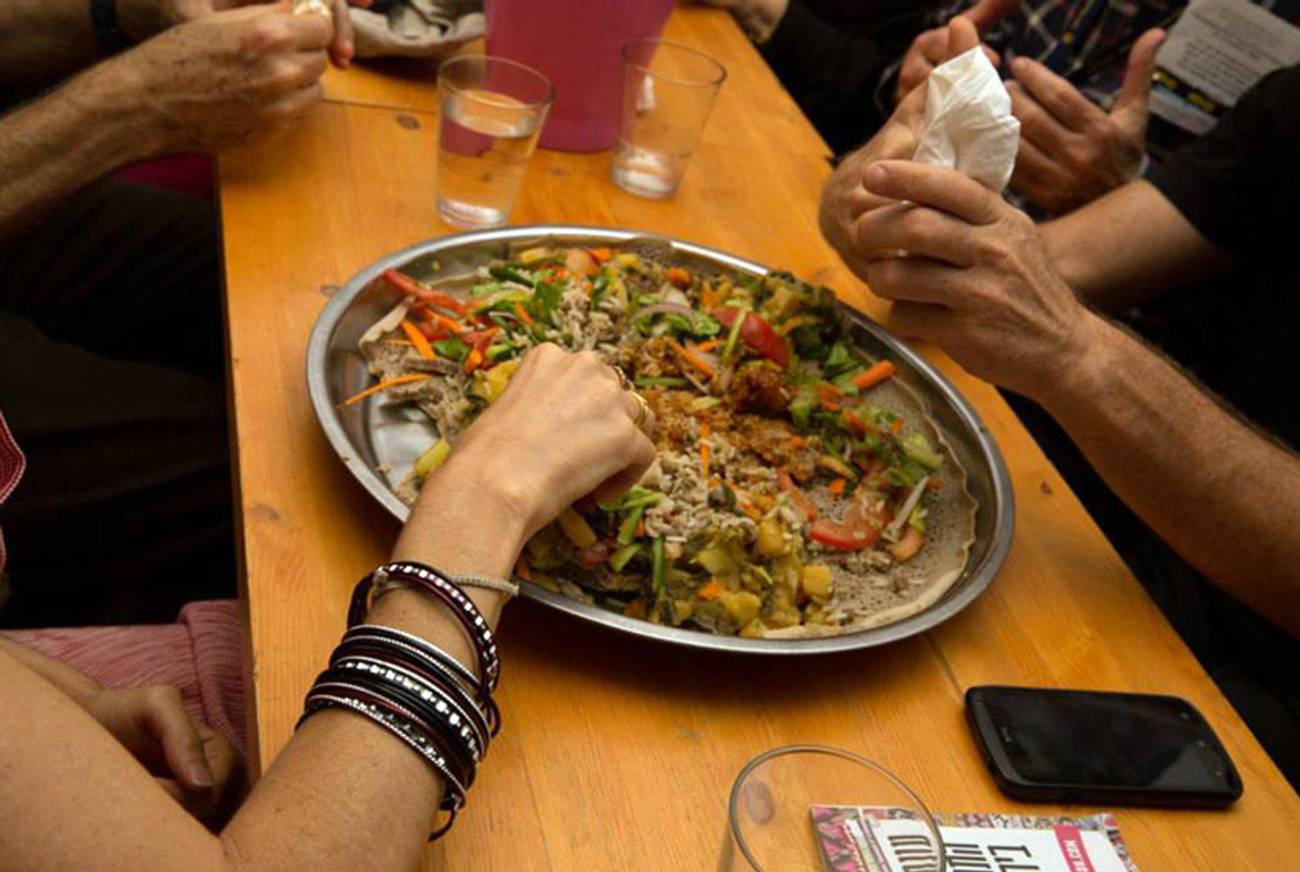Cooking Workshops Offer Israeli Foodies a Taste of African Cuisine
Kitchen Talks events allow migrants from Eritrea, Sudan, and elsewhere to share their recipes, and break down cultural barriers




Fleeing violence in his native Darfur, Hassan Shakur arrived in Israel three years ago. To make ends meet he found work as a dishwasher in a Tel Aviv restaurant called The Streets. But his real passion is cooking. After years in the back of the kitchen, Shakur finally got to work the front in late June—in honor of World Refugee Day—as one of two migrant chefs commanding the kitchen of Jaffa’s Tarnegol restaurant, serving up hefty quantities of Sudanese food. The exotic dinner was part of the Kitchen Talks project, which brings together African migrants and adventurous Israeli eaters.
“What really encouraged me to join Kitchen Talks,” said Shakur, “is first of all, my curiosity about food, and second, the opportunity to know more about the Israeli people and show them our food.”
Shakur, 26, presided over a production line ladling a thick, delicately seasoned soup, known in Arabic as shorbet lubyia, made of white beans. He’d also cooked kabab hala, a stew of meat and vegetables, served with a white flour flat bread called kisra. Alongside he served salat aswad, or black salad; a plate of fire-roasted eggplant mixed with peanut butter; and a lancing red hot sauce called moreh, made of fried onion, lemon, pepper, and bacteria from the guts of a cow.
About 50 people paid roughly $25 each for the chance to try it.
Yifat Unger, 23, said she had never sampled a Sudanese supper. She came with her boyfriend, who sweated as he slathered his food in the atomic hot sauce. “It’s really special,” Unger said. “You don’t usually find peanuts in Israeli food. We only have it in bamba,” a peanut-based snack.
Shakur looked on as Israelis scooped up his specialties. “We are isolated,” he said. “We are not integrated with the Israeli community. Maybe this way I can get to know more Israelis.”
***
The two Tel Avivi founders of Kitchen Talks, Yael Ravid and Goor Somer, say they want to use food to break down the barriers between the thousands of African migrants living in Israel and their Israeli hosts. Ordinarily Ravid and Somer organize workshops in private homes, where migrants give cooking lessons to curious Israelis. (The June event in Jaffa was more of a tasting night at a restaurant; the organizers are considering turning the project into a cooperative with a permanent location.) In the past four months, there have been eight of these events across Tel Aviv, drawing about 10 people to a typical gathering. Ravid said the next workshop will take place in late August or early September. The menu varies each time, with cooks hailing from Sudan, Eritrea, Nigeria, Ivory Coast, and further across Africa; Ravid said she plans to include cooks from Asia as well. Participants pay 130 shekels ($36) to learn at one of the workshops; their money covers ingredients and a small stipend for the cooks.
Ravid said she got the idea while volunteering for Lewinsky Soup, a group that cooks traditional Eritrean and Sudanese food and brings it to the homeless African migrants sleeping in a playground in south Tel Aviv. “We were going to Lewinsky Park every day to feed the refugees,” said Ravid, 33. “And I was thinking all the time that even though I make the food at home and come to the park, there’s still a hierarchy and a gap between me and the people, and I can’t really get to know them. If I want to create an interaction, the best place to do it is in the kitchen. The minute you’re cutting vegetables and cooking together, and asking questions, slowly the ice breaks.”
Areas of south Tel Aviv are full of thousands of migrants from Eritrea and Sudan and the flavors of their cooking. One of the most common jobs for undocumented African migrants is washing dishes and busing tables in Tel Aviv, but those who don’t find work often open their own restaurants without permits. As a result, there are dozens of hole-in-the wall eateries and dry-goods stores stacked with lentils and spices lining Neve Sha’anan, the central boulevard of the south Tel Aviv neighborhood where they live. But these are not stable businesses: In May, health inspectors raided eight Eritrean restaurants in Neve Sha’anan, citing lack of permits and health violations.
Since 2006, about 60,000 African asylum-seekers have crossed the Egyptian border into Israel; just over half are from Eritrea. They live all over the country, but large numbers crowd the impoverished neighborhoods of south Tel Aviv. For the most part they enjoy protected status, meaning they cannot be deported; however, the state has not examined their requests for asylum. This means most have no right to work or register businesses. The result has been bedlam, with poor neighborhoods overrun with thousands of Africans, who crowd into apartments, sleep in the playgrounds, pile into health clinics, and loiter, jobless, in the streets.
Israelis are divided over how to cope. The government sees the Africans as illegal job-seekers; others say they are refugees and that Israel has a moral obligation to help them. In January this year, Prime Minister Binyamin Netanyahu announced that a fence stretching from the Gaza Strip down to Eilat was nearly completed at a cost of $1.4 billion, cutting off 99 percent of the illegal border crossing. Those Africans already in Israel are facing tougher terms. One year ago, the Knesset passed a law allowing police to arrest foreigners for minor infractions like bike theft or graffiti; jail terms last as long as three years. In mid-July, Israel deported 14 Eritrean men back to Eritrea, sparking condemnation from Human Rights Watch and Israeli migrant advocacy groups.
But even as the government deliberates their future, several initiatives to explore the migrants’ neighborhood and their food are cropping up. In addition to the Lewinsky Soup initiative where Ravid got her first exposure to African food, a group called CTLV runs night tours through the neighborhoods. The itinerary includes stops at the weekend bazaar where Africans sell clothing on the street, along with a visit to a Filipino pub in the area. The tours are geared as much to locals as to tourists because most Israelis steer clear of Neve Sha’anan. The grimy seven-story Central Bus Station towers over the streets, and drug addicts and prostitutes sleep in its shadows. Reports of rapes, thefts, and assaults have added to the area’s reputation as a slum.
The area’s harsh realities make it difficult to bridge the cultural gaps between the migrants and other Israelis. Amitai Sandy, an illustrator in Tel Aviv, is part of a group trying to bring tourists and Israelis to the Eritrean restaurants in Neve Sha’anan. The plan was to translate the menus into Hebrew and English and publish a map of recommended eateries. Sandy even designed a logo for the area. But then he learned that many of these restaurant owners are pimps for Eritrean women forced into prostitution—and the initiative slowed down. “There’s no doubt that a refugee who makes a living will feel better and more independent and strong,” Sandy said. “But I don’t think we have a way of checking which restaurants are brothels and which are innocent.”
Sandy’s story shows that breaking bread with Israelis will not, by itself, solve the deeper problems of the Eritrean and Sudanese communities in Tel Aviv. Nevertheless, for the people involved in such a cultural and culinary exchange, cooking together is a moment where asylum-seekers raised on traditional African food find an ideal audience in Tel Aviv’s foodie community. And the exchange works both ways: Shakur says he has been curious about the food on offer in Tel Aviv, which in addition to being the capital of the refugee population is also the culinary center of Israel. “When I go to restaurants, I try to taste everything,” Shakur said. “Right now, I really love couscous. When we cook it in the restaurant—wow. “
***
At June’s Kitchen Talks event, Shakur was paired up with another cook from Africa: Yamane Tesfai, an Eritrean who moved to Israel five years ago to escape his country’s universal draft. He was a cook back home—and he continues to cook for Eritrean weddings on the side. But because he arrived in Israel relatively early, he got a work permit that helped him get a foothold in Tel Aviv’s restaurants: He was first hired as a dishwasher at a branch of Tel Aviv’s Café Café coffee-shop chain. Then he took Hebrew lessons and moved onto the cold line. “I learned how to read the orders, I learned to make the food, to close the kitchen, and do the prep work,” he said. “I work 12 to 13 hours a day. I live well, I speak Hebrew, and I have a lot of friends from the kitchen.”
For the Kitchen Talks event, Tesfai made injera, a flat sour pancake of teff flour that is ubiquitous in Ethiopia and Eritrea. It is served on a large round stainless-steel tray and piled high with vegetable and meat stews. Tesfai’s had hamli, made of onion, carrot, potato, and swiss chard. Another topping was keyh sebhi, a stew made with a berbere pepper mix, onion, beef, and chicken.
As guests ate off the platters, ripping off pieces of injera and dipping them into the sauces, Shakur and Tesfai made the rounds, answering questions. “The plates were coming back to the kitchen scrubbed clean,” Tesfai said, “and it gave me a great feeling.”
***
You can help support Tablet’s unique brand of Jewish journalism. Click here to donate today.
Daniella Cheslow is an American journalist covering the Middle East.
Daniella Cheslow is an American journalist covering the Middle East.